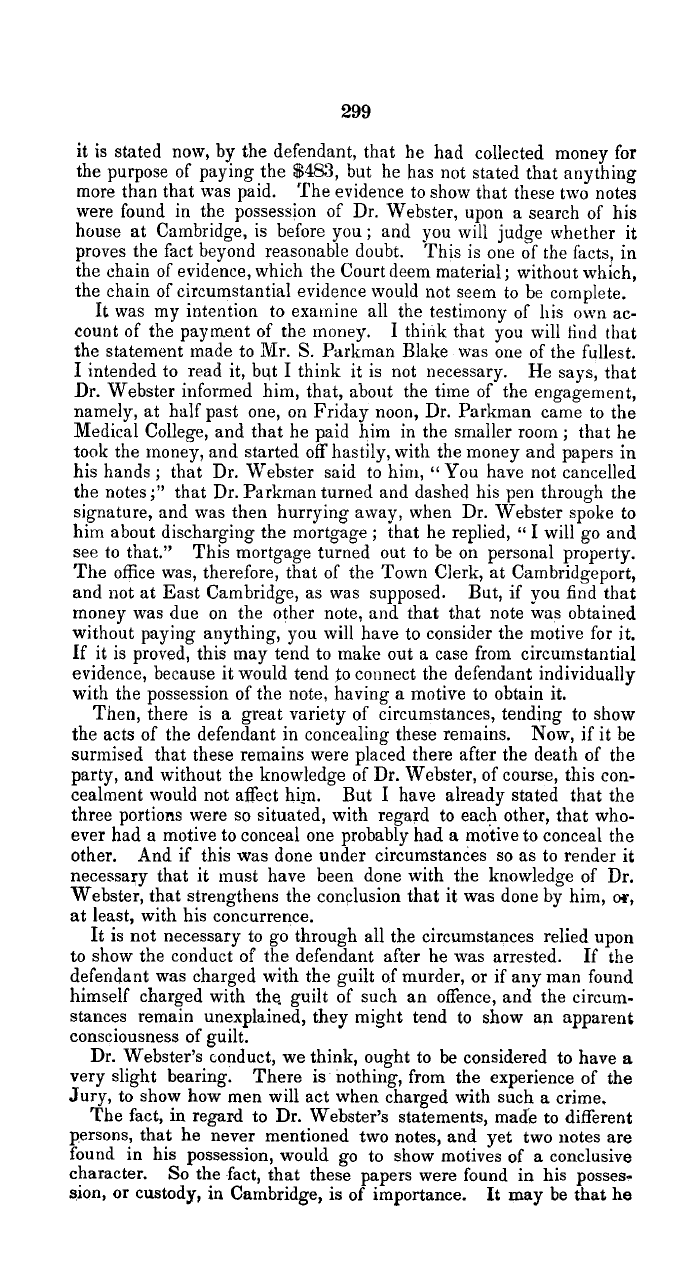|
299
it is stated now, by the defendant, that he had collected money for
the purpose of paying the 8'48.3, but he has not stated that anything
more than that was paid. The evidence to show that these two notes
were found in the possession of Dr. Webster, upon a search of his
house at Cambridge, is before you ; and you will judge whether it
proves the fact beyond reasonable doubt. This is one of the facts, in
the chain of evidence, which the Court deem material; without which,
the chain of circumstantial evidence would not seem to be complete.
It was my intention to examine all the testimony of his own ac-
count of the payment of the money. I think that you will find that
the statement made to Mr. S. Parkman Blake was one of the fullest.
I intended to read it, but I think it is not necessary. He says, that
Dr. Webster informed him, that, about the time of the engagement,
namely, at half past one, on Friday noon, Dr. Parkman came to the
Medical College, and that be paid him in the smaller room ; that he
took the money, and started off hastily, with the money and papers in
his hands ; that Dr. Webster said to him, °' You have not cancelled
the notes;" that Dr. Parkman turned and dashed his pen through the
signature, and was then hurrying away, when Dr. Webster spoke to
him about discharging the mortgage ; that he replied, " 1 will go and
see to that." This mortgage turned out to be on personal property.
The office was, therefore, that of the Town Clerk, at Cambridgeport,
and not at East Cambridge, as was supposed. But, if you find that
money was due on the other note, and that that note was obtained
without paying anything, you will have to consider the motive for it.
If it is proved, this may tend to make out a case from circumstantial
evidence, because it would tend to connect the defendant individually
with the possession of the note, having a motive to obtain it.
Then, there is a great variety of circumstances, tending to show
the acts of the defendant in concealing these remains. Now, if it be
surmised that these remains were placed there after the death of the
party, and without the knowledge of Dr. Webster, of course, this con-
cealment would not affect him. But I have already stated that the
three portions were so situated, with regard to each other, that who-
ever had a motive to conceal one probably had a motive to conceal the
other. And if this was done under circumstances so as to render it
necessary that it must have been done with the knowledge of Dr.
Webster, that strengthens the conclusion that it was done by him, of,
at least, with his concurrence.
It is not necessary to go through all the circumstances relied upon
to show the conduct of the defendant after he was arrested. If the
defendant was charged with the guilt of murder, or if any man found
himself charged with the guilt of such an offence, and the circum.
stances remain unexplained, they might tend to show an apparent
consciousness of guilt.
Dr. Webster's conduct, we think, ought to be considered to have a
very slight bearing. There is- nothing, from the experience of the
Jury, to show how men will act when charged with such a crime.
The fact, in regard to Dr. Webster's statements, made to different
persons, that he never mentioned two notes, and yet two notes are
found in his possession, would go to show motives of a conclusive
character. So the fact, that these papers were found in his posses.
sion, or custody, in Cambridge, is of importance. It may be that he
|

